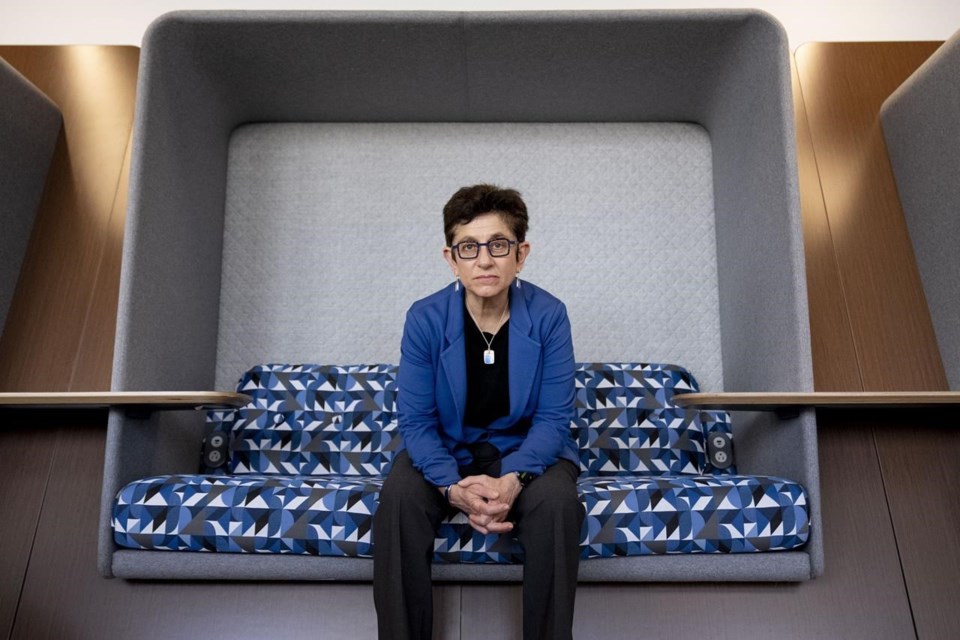WASHINGTON (AP) — When President Joe Biden nominated Gigi Sohn to serve on the Federal Communications Commission, the longtime consumer advocate expected to face criticism over her desire to expand free internet access and improve competition among broadband providers.
Instead, Sohn found herself the target of an aggressive campaign funded by a conservative group that doesn’t have to disclose its donors. The American Accountability Foundation called Sohn too partisan, anti-police and soft on sex trafficking. The attacks landed — to the point that even some Democrats abandoned her. Sohn withdrew her nomination, ditching her fight for a five-year term as an FCC commissioner.
“Look, I’m not naive. I’ve been a consumer advocate my whole career. I knew I was going to get some opposition,” Sohn told The Associated Press. “Now, did I expect what was to come — the dark money, the lies, the caricatures? No.”
The battle over the nomination is the latest example of how organizations with political and financial agendas have been able to sway public opinion by deploying donations that are impossible to trace. It is also emblematic of how nominees’ missteps — even on matters unrelated to their prospective jobs — are being used against them by such organizations.
Sohn’s confirmation would’ve ended a 2-2 split on the commission, enabling the Biden administration to pursue its agenda of making communication networks more equitable. Sohn has been a vocal advocate for such regulations, which have been opposed by the telecom industry.
It is unclear what role, if any, the industry played in the anti-Sohn campaign. The most influential outside groups spent at least $420,000 on ads seeking to torpedo Sohn’s confirmation, a sum that is likely more.
Central to the advertising offensive was the American Accountability Foundation, which produced an advertising blitz assailing the nominee on Facebook and elsewhere.
Another group, co-founded by a former Democratic senator, said it spent “six figures” on ads arguing that Sohn was “the wrong choice for the FCC and rural America.” The National Fraternal Order of Police chastised Sohn over endorsing social media posts that were critical of law enforcement.
Sohn was not likely to coast to confirmation. Moderate Democrats were going to have trouble justifying their support for a nominee who had assisted controversial liberal groups, tweeted negatively about police and accused Fox News of being “state-sponsored propaganda.”
Opposing nominations is hardly new in American politics. But a 2010 ruling by the Supreme Court freed corporations and unions to spend unlimited amounts on political campaigns. The Citizens United ruling also opened the door to an influx of untraceable donations, known as “dark money,” that are being used to influence the course of nominations.
If confirmed, Sohn would have been the FCC’s first openly LGBTQ+ commissioner.
Sohn had served as a top adviser for Tom Wheeler, the Obama-era FCC chair who enacted net neutrality rules that were jettisoned during the Trump administration. Such regulations would have required internet providers to treat web traffic equally. The telecommunications industry has argued that such rules are illegal and burdensome.
Some business groups pounced at Sohn’s nomination, while telecommunications companies and their trade organizations took a less combative approach.
It is unknown whether those companies donated dark money to groups that attacked Sohn. A spokeswoman for USTelecom, a national trade association on broadband, said the group and its “members did not take a position on Ms. Sohn’s nomination.”
Behind the scenes, however, the industry’s lobbyists worked hard to kill the nomination, according to Sohn. Telecom companies are among the nation’s biggest spenders on lobbyists, with the industry shelling out $117 million last year to influence lawmakers and administration officials, according to OpenSecrets.
“It was a perfect storm of, you know, industry interests,” Sohn said in an interview last month.
Sohn took particular umbrage with the campaign waged by the American Accountability Foundation, which boasted it spent “hundreds of thousands of dollars” on advertising.
AAF dished out more than $320,000 on Facebook advertising. Such ads blasted Sohn over her connections to liberal groups and suggested she opposed stiffening sex-trafficking laws. An ad alleged she was a “complete political ideologue.”
The organization targeted most of its advertising in states where Democratic senators are up for reelection next year. In the closely divided Senate, nominees can lose only one Democratic vote if they hope to win the job if all Republican senators oppose them.
AAF also promoted criticism of Sohn over Twitter posts in 2020 that suggested she supported the “defund the police” movement and agreed with a tweet that alleged police were “armed goons with tear gas.”
AAF executive director Tom Jones declined to name the group's donors.
Jones' group was joined in its campaign against Sohn by other organizations, including one led by Heidi Heitkamp, a former Democratic senator from North Dakota.
Heitkamp’s One Country Project announced in 2022 it was spending at least $100,000 on a campaign to oppose Sohn’s nomination by highlighting her purported disregard for rural broadband.
Heitkamp did not respond to requests for comment. She collected more than $106,000 in donations from the telecommunications industry during her 2018 Senate campaign, according to OpenSecrets.
The National Fraternal Order of Police also opposed the nomination, a move that surprised Sohn because the police union has no business before the FCC. The group said that a vote for Sohn “would show a complete disregard for the hard-working men and women of law enforcement.”
Sohn said she knew her nomination was dead at her February confirmation hearing. That’s when Jacky Rosen, a Nevada Democrat, said police concerns about the social media posts “do give me pause.” Other Democrats, Sohn said, put little effort into parrying Republican attacks.
Three weeks later, she withdrew from the fight.
Trenton Daniel, The Associated Press



